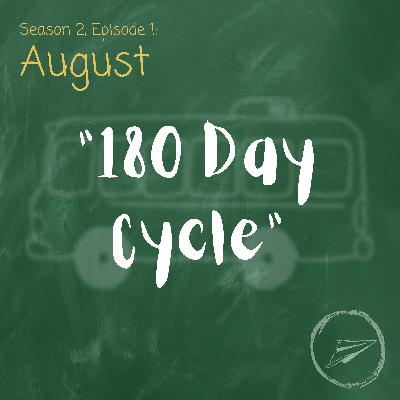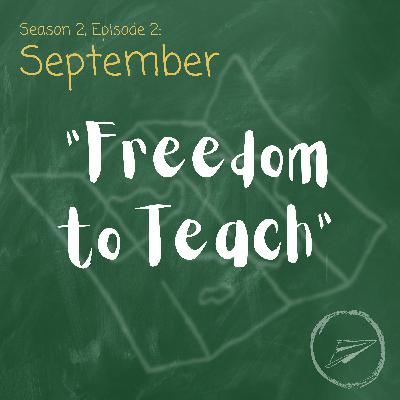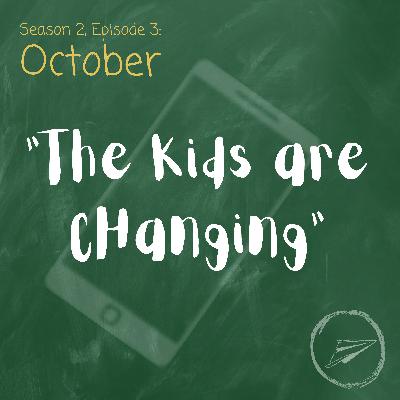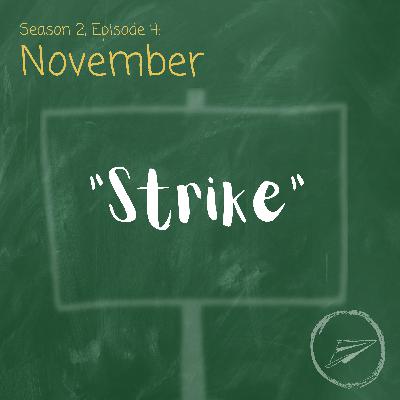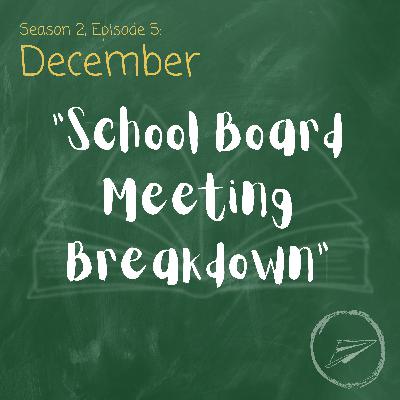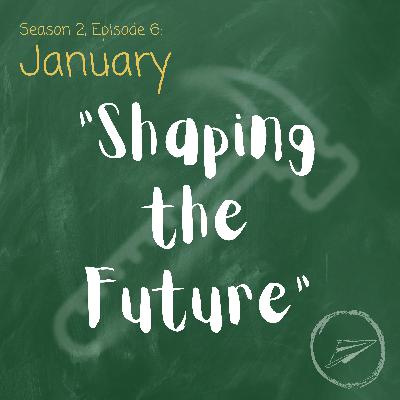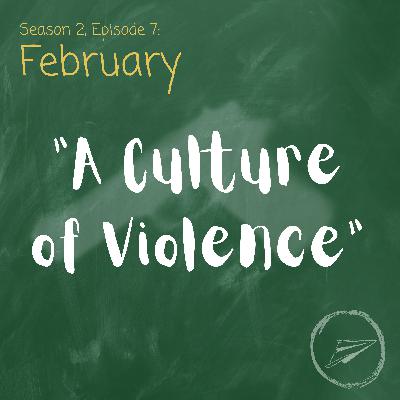3: What Would Robin Williams Do?
Description
The most easily recognized teachers in our culture are on the big screen. So when we think about good teaching, it’s almost impossible not to think of Robin William’s character in Dead Poets Society standing on a desk and inspiring his students. This might be part of the problem. When teaching is associated with unrealistic Hollywood characters, it can create impractical or ridiculous assumptions about what teachers do. In this episode, we hear how the stereotypes of teachers may be contributing to teachers’ decisions to leave education.
Music:
Theme Song By Julian Saporiti
“NPC Theme” by HoliznaCC0 is in the Public Domain.
“Sunny Afternoon” by HoliznaCC0 is in the Public Domain.
“Infrastructure” by Scott Holmes Music is licensed under a CC BY-NC license.
“Just a Blip” by Andy G. Cohen is licensed under a CC BY license.
“Room With a View” by Jahzzar is licensed under a CC BY-SA license.
Movie Clips:
Freedom Writers (Paramount Pictures)
Dead Poets Society (Touchstone Pictures, Walt Disney Studios Motion Pictures)
School of Rock (Paramount Pictures)
Ferris Bueller (Paramount Pictures, United International Pictures)
Transcript:
Episode 3: “What Would Robin Williams Do?”
There is a picture-day-esqu photo on my parents’ fridge of me sitting on my dad’s lap. I am wearing a tie-dye shirt and my orange hair is in its natural state of an Eddie Munster widows peak. My dad is in a blue button down and has on a tie. My cheeks crowd my eyes, my smile is so big. My dad, who doesn’t always smile for pictures, has a cheeky grin.
This picture was taken around the same time that my dad squatted down to eye-level with me and said: “When people ask you where you got your red hair, you tell them the milkman. Okay?”
He didn’t make a big deal about telling me this. It was just a directive, and I said okay. I figured, yeah, that makes sense.
So as adults would come by, ruffle my hair and say things like, “Oh my, what pretty red hair. Where did you get hair like that?”
I’d look up at them, smile, and tell them, “The Milkman.”
They would guffaw, cough down a drink, blush, and I’d try to explain, “You know, because he delivers things.”
And they’d laugh out an “I’m sure he does!” and find my dad who would have a grin settled between his bouncing shoulders as he muffled a laugh, and my mom would say something like “G-uh, Darcy Joe”
Not to be heavy handed, but the stereotypes of what a milkman may or may not do when visiting people’s homes is what makes the joke land. This joke was lost on me until high school. I didn’t understand the baggage associated with being a milkman.
Language matters. Words like milkman have connotations - they carry weight or have stereotypes attached to them. That’s why I can’t flip someone off and say, “Why are you upset,this means joy to me.” There are too many representations of middle-fingers that situate the digit as a symbol of the obscene. Repetition and representation give meaning.
The middle finger or terms like milkman or teacher, carry a history of expectations and stereotypes. Last episode we heard about the historical inheritance of teachers, which is significant in how we view modern teachers. But history isn’t the only thing that impacts how we view teachers. Today, we’re going to look at the teacher stereotypes in pop-culture and how these stereotypes can be contributing to teacher attrition.
This is Those Who Can’t Teach Anymore, a 7-part podcast series exploring why teachers are leaving education and what can be done to stop the exodus. I’m Charles Fournier.
Here is part 3: “What Would Robin Williams Do?”
Molly Waterworth: I've gotten to the point where I see any TV show or movie where some sort of plot device hinges on the inspirational teacher. And I just roll my eyes.
This is Molly Waterworth. We heard from her last episode, and she just left education after teaching English for 8 years. She points out a stereotype of inspiring teachers in media:
Molly Waterworth:I just can't. I can't stomach it because it's so saccharin. It completely obscures the fact that these inspiring teachers that are either drawn from real life or the product of someone or someone's imagination, it completely obscures the fact that their inspirational teaching is very likely the outgrowth of massive mental health deficiencies. And like a complete imbalance of where they spend their time and where they're getting like their soul fed. Inspiring teacher stories make me feel awful.
That shouldn’t be the case, right? Inspirational teacher movies should INSPIRE. And they can and they do - they inspired me - but what Molly points to is a nagging reality in many inspirational teacher stories.
Dead Poets Society Clip
As you can hear in this scene from Dead Poets Society, Mr Keeting, played by Robin Williams, pushes his student, Todd Anderson.. And in this unconventional way Mr. Keeting helps Todd start to gain some confidence and see his potential. Similar scenes occur in other famous teacher movies, like Mr Holland’s Opus, or Freedom Writers.
These movies project a fantasy of heroism onto education, and people love it. Inspirational teacher movies are usually underdog stories: A teacher rails against convention and inspires and does amazing things for others no matter the personal cost. We are attracted to this as a culture. We want heroes that are selfless. We want to see ourselves as capable of being like Robin Williams’ character in Dead Poets Society.
And the way these movie teachers influence kids…man, that’s the dream. But, several if not most of the teachers in those stories that inspire don’t have the healthiest work-life balance. They give everything to their students - time, energy, love, inspiration. And these movie teachers inspire in the public comments like, “We need more teachers like this” or “I wish teachers would be more like (whatever movie teacher).” But we need to ask, what is expecting teachers to fit a stereotype asking of real teachers?
Think of Freedom Writers, a movie based on the real-life Erin Gruwell, who is played by Hillary Swank. She is the epitome of the inspirational teacher stereotype. Halfway through the movie, her husband leaves her because she is spending so much time focused on her students,
Freedom Writers Clip
The film creates a feeling that the husband might be unrealistic. As an audience, we’re rooting for Erin Gruwell because she does amazing things - her husband points this out. And don’t get me wrong, Ms.Gruwell is phenomenal and her story is amazing, but there might be danger in presenting this story as a precedent for what good teaching looks like. Yes, she is a good teacher, but at what cost? In most other films about different careers, it’s likely the main character would realize that work is taking too much and family is more important, but not in inspirational teacher movies. Expecting teachers to do what Gruwell does is expecting teachers to forfeit their own lives for students. It’s expecting martyrdom. This is a stereotype.
And the reality is different.
Molly Waterworth: We're not martyrs, and we're not perfect. And there are things that can be said about the profession as a whole and certainly about individual teachers that needs improvement, absolutely. But I think a lot of it maybe stems from just this sense that teachers aren't entirely human - that we are saints. And so therefore, we shouldn't worry about all of these factors that are making our jobs harder, because we have this big calling on our lives that turn us somehow into people that don't have needs.
This language that surrounds teaching is significant. It feeds the stereotype of selflessness, which in turn has an impact on how teachers are treated. Right now teachers are feeling burned out because this stereotype is unrealistic - it’s creating an expectation that makes teachers want to leave education.
I met up with Rachael Esh at Welcome Market Hall in Sheridan, Wyoming on the eve of her very last day as a teacher.
Rachael Esh: It's a bit of a stereotype with teachers. It’s like, Oh, this has been your calling since you were this age, or since this teacher impacted you.
This idea of a calling is that you don’t teach for the money, you do it for the kids because it is what you were meant to do. It is your destiny or purpose. A quote unquote “calling” can create a sense of guilt in teachers when they realize, crap, I’m not getting paid enough for this, which is in contrast to the narrative surrounding teaching like Molly points out:
Molly Waterworth: People don't get into this for the money, why would they? But they're in it for the kids, and they're in





